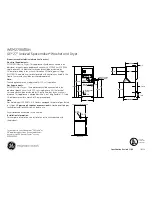
Environmental protection and saving energy
en
11
3 Environmental protec-
tion and saving energy
3.1 Disposing of packaging
The packaging materials are environ-
mentally compatible and can be re-
cycled.
▶
Sort the individual components by
type and dispose of them separ-
ately.
3.2 Save energy and con-
serve resources
If you follow these instructions, your
appliance will use less electricity and
less water.
Choose programmes with low tem-
peratures and longer wash times and
use maximum load capacity.
a
Energy consumption and water
consumption is most efficient.
detergent based on the laundry's de-
gree of soiling.
a
For light to normal soiling, a smal-
ler amount of detergent is suffi-
cient. Observe the dosage recom-
mendation from the detergent
manufacturer.
Reduce the washing temperature for
lightly and normally soiled laundry.
a
At lower temperatures, the appli-
ance consumes less energy. For
light to normal soiling, lower tem-
peratures than indicated on the
care label are also sufficient.
Set the maximum spin speed if you
want to dry the laundry in the tumble
dryer afterwards.
a
The drier the laundry, the shorter
the programme duration when dry-
ing which, in turn, reduces energy
consumption. A higher spin speed
reduces the residual moisture in
the laundry and increases the
volume of the spin noise.
Wash the laundry without prewash.
a
Washing with prewash increases
the programme duration and in-
creases energy and water con-
sumption.
The appliance has a continuous
automatic load adjustment function.
a
Depending on the type of fabric
and load capacity, the continuous
automatic load adjustment func-
tion optimally adjusts the water
consumption and programme dur-
ation.
3.3 Energy saving mode
If you do not use the appliance for an
extended period, it automatically
switches to energy-saving mode.
Energy-saving mode ends when you
use the appliance again.
Summary of Contents for WAN28206GR
Page 51: ......












































